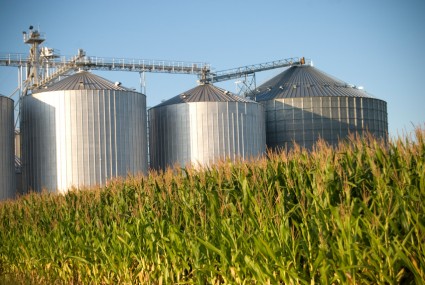 Obama’s ag policy has come under justifiable criticism from the sustainable food movement–see here and here–for its aggressive pro-biotechnology and pro-trade policies. But it has also managed to enrage industrial-ag interests, too, with its “Know your Farmer” program and other gestures toward alternative food. King Corn, it turns out, is a sensitive sovereign.
Obama’s ag policy has come under justifiable criticism from the sustainable food movement–see here and here–for its aggressive pro-biotechnology and pro-trade policies. But it has also managed to enrage industrial-ag interests, too, with its “Know your Farmer” program and other gestures toward alternative food. King Corn, it turns out, is a sensitive sovereign.
Check this out, from the farm journal Brownfield:
The chairman of the Iowa Corn Promotion Board is expressing concern about the USDA’s shift in emphasis toward locally grown and organic foods.
Oh, oh–a corn guy’s getting pissed. In addition to leading his state’s Corn Promotion board, Tim Burrack of Arlington, Iowa is also a farmer. And apparently, he aired his grievance at a public USDA presentation in Iowa featuring Kathleen Merrigan, the agency’s progressive deputy secretary.
From Brownfield:
“I’ve farmed for 37 years and worked with the government and everything–and what I’m hearing out here is radically different than what has taken place in the first 36 years of my career,” Burrack says. “And I just got up and told them so — I said, ‘this is not the USDA that people in the Midwest are familiar with.'”
Burrack goes on to describe Merrigan’s response to his complaint:
And she said, ‘well, you know, the USDA is a big place and there’s room in the tent for everybody.’ So I guess that’s the attitude that we all need to work under … The concern is that traditional production agriculture has provided for this nation a very safe and very low-cost food supply. And a lot of the emphasis you’re hearing here today is — well, you know, it won’t be cheap food like what we’ve been familiar with. It’s a higher cost source of food — but they say we’re going to do it all.
Burrack then addresses the question of whether he’s surprised that these scary new directions are happening under Tom Vilsack, former Iowa governor and staunch supporter of GMOs and ethanol. “No,” he replies, “because it’s very apparent the direction is coming from above him [Vilsack].”
The corn man adds that his comments to Merrigan went over well with the crowd. “I was amazed at the number of USDA employees-and attendees like myself that made a comment to me afterwards saying, ‘thank you for saying what a lot of us are thinking,'” he said.
Now, change is always alarming; and any of us will defend our livelihood if we perceive it under threat. But Burrack should reflect that aside from “Know Your Farmer” — which doesn’t actually bring additional resources to the table for sustainable farming — the Obama administration is aggressively pursuing the corn-ethanol program, thus ensuring growing demand for Burrack’s product. The administration is also pushing to break down any remaining barriers to foreign trade in ag goods, ensuring that U.S. corn farmers will have a place to sell, not to say, dump, any surpluses that might occur.
True, the administration is pushing for farm-subsidy cuts, but it’s difficult to imagine that happening any time soon, given the power and composition of the Congressional agriculture committees.
It should also be noted that when Burrack complains about the still-paltry USDA resources committed to sustainable ag projects, corn growers get between $2 billion and $9 billion in crop subsidies every year. He himself has evidently become accustomed to that largesse. According to the Environmental Working Group database, Burrack Farm Inc. reeled in more than $1 million in crop subsidies between 1995 and an 2006.
I’ve said it before, and I will say it once more: societies need to support farmers, if they want a robust and ecologically sustainable food supply. But the idea of paying farmers by the bushel to grow resource-intensive corn — by far our biggest fertilizer-dependent, and thus, soil-destroying crop — is insane.


